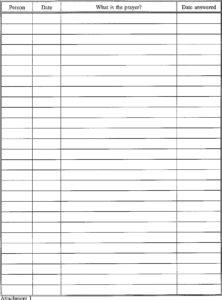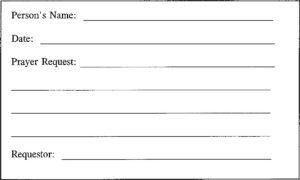SCRIPTURE ON PRAYER
Romans 12:12 – Be joyful in hope, patient in affliction, faithful in prayer.
Matthew 7:7-8 – Ask and it will be given to you; seek and you will find; knock and the door will
be opened to you. For everyone who asks receives; he who seeks finds; and to him who
knocks, the door will be opened.John 16:24 – Until now you have not asked for anything in my name. Ask and you will receive,
and your joy will be complete.Matthew 6:6 – But when you pray go in to your room, close the door and pray to your Father,
who is unseen. Then your Father, who sees what is done in secret, will reward you.Matthew 18: 19-20 – Again, I tell you that if two of you on earth agree about anything you ask
for, it will be done for you by my Father in heaven. For where two or three come together in
my name, there am I with them.1 Thessalonians 5:16-18 – Be joyful always; pray continually; give thanks in all circumstances,
for this is God’s will for you in Christ Jesus.Philippians 4:6 – Do not be anxious about anything, but in everything, by prayer and petition,
with thanksgiving, present your requests to God.Ecclesiastes 5:2-3 – Do not be quick with you mouth, do not be hasty in your heart to utter
anything before God. God is in heaven and you are on earth, so let your words be few.Luke 6:28 – bless those who curse you, pray for those who mistreat you.
Ephesians 6:18 – And pray in the Spirit on all occasions with all kinds of prayers and requests.
With this in mind, be alert and always keep on praying for all the saints.Matthew 21:22 – If you believe, you will receive whatever you ask for in prayer.
 STRUCTURE OF A PRAYER
STRUCTURE OF A PRAYER
Matthew 6:9-13
Acknowledgement of authority
- Our Father in heaven, hallowed be your name,
Recognition of power
- your kingdom come, your will be done, on earth as it is in heaven.
Our petition simplified to the basics
- Give us today our daily bread.
Acknowledgement of our sins and an important footnote
- Forgive us our debts, as we also have forgiven our debtors.
A request for His guidance
- And lead us not into temptation,
Our need for His continuous protection
- but deliver us from the evil one.
IDEAS FOR CLASS PRAYER
Keeping a prayer log
 This downloadable sample represents a sheet that can be reproduced and passed out among the study group. The purpose of this form is to keep a log over time (e.g. 3-6 months, longer is better) and reflect back over our petitions to God so that we may rejoice in answered prayer. There are some rules that help this type of prayer sheet work best.
This downloadable sample represents a sheet that can be reproduced and passed out among the study group. The purpose of this form is to keep a log over time (e.g. 3-6 months, longer is better) and reflect back over our petitions to God so that we may rejoice in answered prayer. There are some rules that help this type of prayer sheet work best.
[1] The prayers should be definitive enough to know if and when God has given his response and of a duration suitable for this log.
An example of a prayer that is too open for this type of class project might be: “Pray that my new grandchild grows up to be a Christian.” A more effective prayer for tracking short term could be: “Pray that my visit this week with my grandchild offers me an opportunity to share Christ.”
[2] Limit the number of open requests anyone person has on the list to one or two.
The idea is to have all participants share and pray for each other. Add new prayers for someone when they have taken the current prayer request off the list.
[3] Review the open prayer requests weekly and check off those that have been answered by God. Keep praying for those that have not. If someone wants to remove a prayer from the list before it is answered, that’s fine.
[4] Ask all class participants to set aside a formal time each day and pray over the list of prayer requests. Ask them to bring the lists with them weekly so that updates may be made to the lists.
Prayer cards
 Using 3 by 5 inch index cards, write the name of a person that you are praying for on the top. On the card, write the date of the request, the name of the requestor (for follow-up) and the prayer. Pre-printed cards are nice to use (Here is a downloadable sample). Make the cards available for anyone to use at any time. The cards should be kept together with the study guide material. Each week the stack of cards are passed out with each member of the class requested to randomly take one or more (spread the cards out evenly among class members). Use a few minutes at the end of the class for silent prayer with each person praying for the card(s) that they have taken on that day. The cards are collected again at the end of the class. This type of activity is excellent for long term prayers. Periodically, review the prayers with those who have filled them out to see if the cards should be removed from the stack. A good thick stack of cards is a wonderful challenge to have to deal with.
Using 3 by 5 inch index cards, write the name of a person that you are praying for on the top. On the card, write the date of the request, the name of the requestor (for follow-up) and the prayer. Pre-printed cards are nice to use (Here is a downloadable sample). Make the cards available for anyone to use at any time. The cards should be kept together with the study guide material. Each week the stack of cards are passed out with each member of the class requested to randomly take one or more (spread the cards out evenly among class members). Use a few minutes at the end of the class for silent prayer with each person praying for the card(s) that they have taken on that day. The cards are collected again at the end of the class. This type of activity is excellent for long term prayers. Periodically, review the prayers with those who have filled them out to see if the cards should be removed from the stack. A good thick stack of cards is a wonderful challenge to have to deal with.
Published prayer list
If there is someone who has access to a word processor, then a formal weekly prayer list can be quite convenient. A class volunteer becomes the collector for prayer requests. On a weekly basis, a list of prayer requests is published and handed out to the class. Each class member is requested to find time (one a week to start with growing to once a day) to pray over the list. Refrigerator magnets are great to use so that the prayers are kept visible to the entire family and needs of others remain visible.
Class prayer ideas
The appointee: class participants are asked to share their prayer requests. A single appointee then consolidates and opens or closes the class with prayer. The appointee should be varied each week so all can share in the opportunity to pray for the class.
Silent prayer: class participants discuss their prayer requests and then the class closes in silent prayer.
Circular prayer: This works well if you are seated in a circle. One person begins and prays. Either randomly or, in order, each class participant prays. Participating should be presented as optional since many people may be uncomfortable with group prayer of this type.
A class specifically on prayer
Before starting on a project involving class prayer or adding a formal prayer program to an existing class, it could be beneficial to hold a class specifically oriented toward prayer. Some discussion ideas are listed below:
- John 16:24 – What is prayer? In whose name should we pray? What results from prayer?
- Matthew 7:7-8 – What does Jesus teach about prayer?
- John 15:7, 1 John 5:14-15 – What are some important conditions for answered prayer?
- Jeremiah 33:3, Ephesians 3:20 – What is the characteristic of God’s answers to prayer?
- Matthew 7: 9-11 – What kind of gifts does God give his children? How do you think God would respond to a request for something He knew would be bad for you? What do you think God would do if he knew the answer would be better for you at another time?
- Philippians 4:6-7 – What is the wrong reaction to have toward difficult circumstances? What is the right response? What is the result of this right response?
- Philippians 4:7 – What results from the peace that comes through prayer?
- Luke 1:13-14 – What resulted when Zachariah and Elizabeth prayed for a son?
- James 4: 3, Psalm 66: 18 – What are some hindrances to answered prayer?
Bible Truth Being Taught
Prayer should be an active component of a person’s life.
Our Response
To understand that prayer works.
